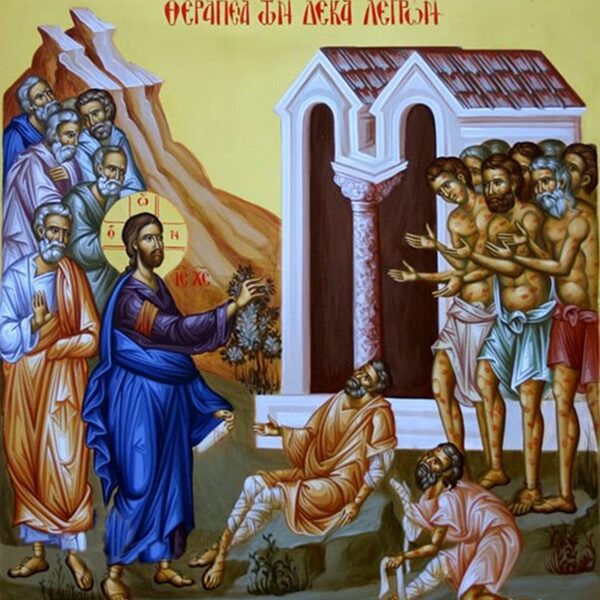Ingratitude and Thanks
18 January 2021‘Now on his way to Jerusalem, Jesus traveled along the border between Samaria and Galilee. As he was going into a village, ten men who had leprosy met him. They stood at a distance and called out in a loud voice, “Jesus, Master, have pity on us!”. When he saw them, he said, “Go, show yourselves to the priests.”. And as they went, they were cleansed. One of them, when he saw he was healed, came back, praising God in a loud voice. He threw himself at Jesus’ feet and thanked him- and he was a Samaritan. Jesus asked, “Weren’t ten cleansed? Where are the other nine*? Has no one returned to give praise to God except this foreigner?”. Then he said to him, “Rise and go; your faith has saved you”.’
It’s terrible to imagine even for a moment that we might be estranged from all other people, with no chance whatsoever of contacting or meeting them, with a body that is sick and in constant decline from an infectious disease and, moreover, under the constant reproach that the sickness from which we are suffering is punishment for our sinful life. And then suddenly, somebody comes along who cares nothing for the risks, who tramples upon the prevailing social prejudices and shows fearless and boundless love. Would we not feel infinite gratitude to him?

This was the state of the ten tragic invalids presented in the Gospel narrative for the 12th Sunday of Saint Luke. They were touched by Christ’s saving grace and therapeutic power. God’s love, incarnate in the world and revealed by the life and death of Christ, isn’t limited to a few, to the chosen, to His own people. It extends even- or rather, especially- to those whom the ‘serious’ and ‘pious’ people at any given time consider unclean and sinful. It knows no social, political or religious bounds. In today’s narrative it declares itself to ten people united in the pain of an infectious disease. Christ encounters them and talks to them, transcending the Mosaic Law, which forbids any truck with lepers. One of them, wasn’t even Jewish; he was a Samaritan.
And yet, it was the attitude of the latter that is impressive and is emphasized by the Evangelist. Nine of those who were healed were full of the joy of being restored to good health, of meeting their friends and relations, of seeing their bodies well and cleansed. And they forgot to express their gratitude to Christ, their Benefactor. This is a typical example of those people who call upon God in their sorrow and pain, but ignore Him in joy. They think God is their last refuge in sickness and not their first friend in health and joy. It’s certainly true that the agonized cries for help which are addressed to God every day are more than the prayers of thanksgiving and gratitude.
There are many things in our lives which we take for granted, without feeling any need to thank anyone for our daily blessings. Self-sufficiency and self-confidence leave no room for gratitude towards God, our Benefactor. It’s difficult to get our lips to move to say ‘Thank you’, but easy, almost spontaneous, to address cries and requests for help in times of need. And this is where something very typical occurs: once the need has passed, we not only forget the moment of weakness, or are even ashamed of it, but we also attempt to balance out the weakness we’ve shown, by acting in a boastful or self-confident manner.
This attitude is purely human and is an indication of the way in which we’re trapped in the defensive attitude of our egotistical self. Yet the redemptive love of God envelops us on a daily basis. Christ’s cross isn’t merely the culmination of a series of saving actions performed by God on behalf of His creation; it’s the beginning of endless bounties which He heaps upon us. The greatest of these is the triumph over the fear of death and the blossoming of the hope of the resurrection.
When the stench of death threatens to change everything around us into a graveyard, is there a fundamental need for any gratitude towards God or any hope of a new life without pain, sorrow or the fear of death? Closing in on ourselves, Pharisaical self-sufficiency and seemingly powerful self-confidence bear the seal of the fear of death. Opening our heart to God, as our answer to His infinite bounties, to the gift of life which He generously offers us, is the best way of expressing our thanks. Grateful thanks which will naturally be accompanied by behavior worthy of the divine gift. In the narrative we’ve examined, Christ was thanked by a foreigner, a Samaritan and, as such, a person scorned by the pure Jews. The pain of sickness united the ten lepers; the gratitude of one, the Samaritan drew His admiration and recognition of the man’s faith.






